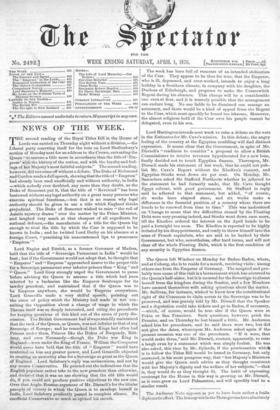Lord Napier and Ettrick, as a former Governor of Madras,
held that the title of "Sovereign Paramount in India" would be beat; but if the Government would not adopt that, he thought that 44 Emperor" and " Empress "approached nearer to the proper title for a Sovereign paramount over inferior princes than "King " and 4' Queen." Lord Grey strongly urged the Government to pause before advising the Queen to assume a title which had been selected by a barbarian like the Emperor Soulouque for its tawdry grandeur, and maintained that if the Queen was to be Empress anywhere, she would be Empress everywhere. Lord Granville made a very skilful speech, pointing out the error of policy which the Ministry had made in not con- sulting the Opposition about a change of usage in which the Throne itself was so deeply interested, and citing -the precedents for keeping questions of this kind out of the arena of party dis- cussion. The British Government had always steadily maintained that the rank of the Queen, as Queen, was not inferior to that of any Sovereign of Europe; and he remarked that Kings had often had Princes under them, Princes like the Dukes of Burgundy, Brit- tany, and even Normandy—though the Duke was King in England—were under the King of France. William the Conqueror would never have held that the title of " Emperor " would have conferred on him any greater power, and Lord Granville objected to creating an unworthy alias for a Sovereign so great as the Queen of England. Lord Salisbury's reply was acrimonious, and not by any means Conservative. He pointed out the indications that the English populace rather take to the new grandeur than otherwise, and declared that it was no use showing that the old title would do, if you could not produce positive objections to the new one. Over that Anglo-Russian argument of Mr. Disraeli's for the titular panoply of victory in which the Queen is to envelope herself in India, Lord Salisbury prudently passed in complete silence. No unofficial Conservative so much as opened his mouth.


































